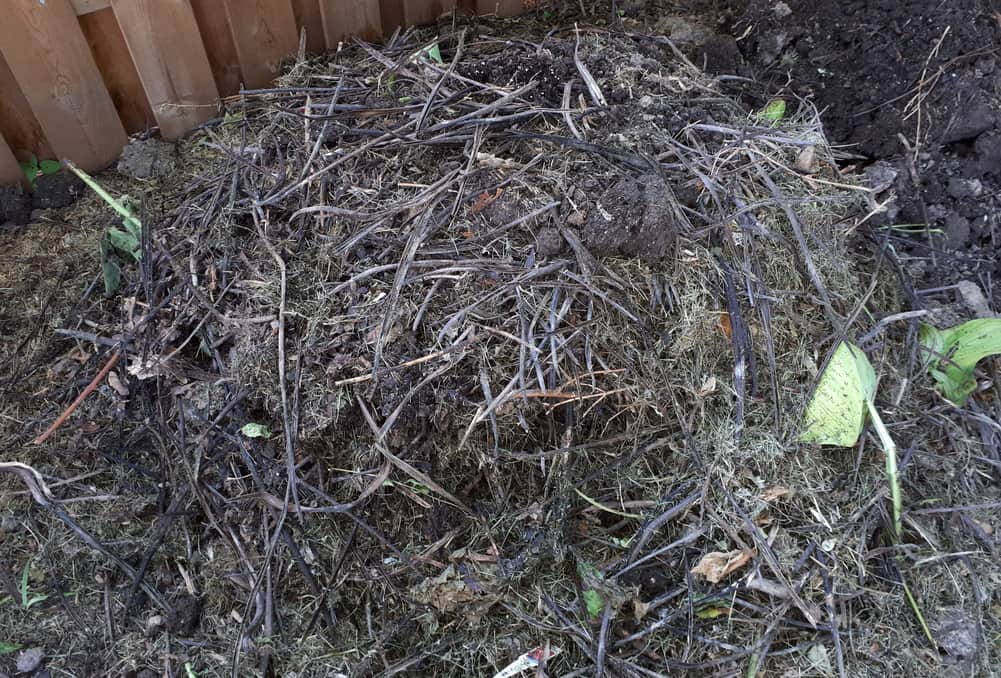One of the most common problems that many people interested in backyard composting have, is a problem with the pile beginning to stink or smell very bad. Common complaints are that the pile smells like rotten eggs or sulphur, the pile smells like feces or that the pile smells very sweet and appears slimy.
Overall, the reason for your compost pile smelling bad is almost always due to the lack of microbial activity and therefore the pile is more or less actually rotting and not breaking down into compost properly.
There are several things that may be occurring in your pile
or how you maintain it that will most likely be the cause of this, and we can go over them here. Rest assured that there is a fix and we can get your compost “stink Free” in no time!
Causes of a smelly Compost Pile
In a perfect world, where everything is going exactly the way you want it to, your compost pile should almost always have a earthy, dirt like smell to it. This would mean that the microbial count and activity would be at perfect levels and the you mix of organic materials is right on target. This situation is sometimes harder to accomplish than it looks.
The Microbial Imbalance Problem
Along with the many creepy crawlies such as worms that are eating and transforming the organics into compost, there are also countless many micro organisms that are doing most of the work as well. These little guys are the ones doing the heavy lifting and to do so, need a good balance of greens, browns and moisture to keep them going.
Addressing the problems below that your compost pile or bin may have is what will fix the microbial imbalance within it. And therefore, will help get rid of that nasty smell.
NOTE: These problems can exist in one form or another in all types of composting systems weather they be bins, tumblers, ditch, vermicomposting or even the simple heap or pile.
The Pile Is Too Wet
A very common cause of smelly compost is that the pile is far too wet. This is especially true during the rainy Spring and Fall months of the year.
If the pile has too much moisture in it, almost all the microbial activity will stop and actual “rotting” of the material will take the place of composting.
Too much moisture in the compost will also cause a severe lack of oxygen, which also causes all the good creatures and microbes to stop doing their job.
If you dig into the pile a few inches and notice the smell getting very strong and the organic materials have a blackish, slimy texture, you most likely have a wet pile.
The Remedy – Check to see if the pile is in the lowest part of the yard. This may be an area where water collects and therefore keeps the pile wet longer. Try to move the pile to a slightly dryer location if possible.
If you notice that the pile is getting too wet and smelling during the rainy season you can cover the pile with a tarp for during the few weeks when rain is heavy. This will help keep excess moisture off the pile.
Rain isn’t usually a problem with enclosed composters like the plastic square bins that are very common and tumblers which are both enclosed systems.
Ensure that your compost pile’s bottom isn’t blocked off but is instead part of the ground itself. This means that the compost isn’t sitting on a tarp or concrete. If that is the case it may be preventing the pile from draining and excess water as needed.
After ensuring that all possible causes of too much water have been addressed, it would be a good idea to turn the pile over and even add some more brown materials to the pile. This will help to add dry materials to help absorb the moisture and turning the pile over also helps add the ever-important oxygen to the mix.
The Pile is Too Compacted / No Aeration
Speaking of adding oxygen to the pile, another major cause of a stinky compost pile is a compost mix that is far too compacted and therefore lacking in oxygen.
In this case, instead of too much moisture causing the microbes to stop working properly, the heavy compaction is the problem. With the materials being so tight together, all the usable oxygen in the pile quickly gets used up and then once its gone, the microbial activity stops.
Compaction is a very common problem and usually happens when compostable materials are added to the top of the pile over time and the pile itself is left to break down on its own with little to no mixing of the materials.
For example, generally what happens is a person may cut their lawn one day and put the grass clipping on the compost pile. The next day, they may add the collection of kitchen scraps, and rake the leaves and trim the shrubs a few days later and put that material on the pile. They may follow this routing week in and week out never touching the pile other than to add material. This habit will generally cause the pile to compact down and most composting will cease to continue.
The key to stopping this from happening is to remember to turn over the contents of your pile or bin on a regular basis. Once every week or two. This will not only loosen the material, allowing oxygen to permeate throughout the pile, but will also help keep a good mix of greens to browns that is so crucial to creating great compost.
Too Heavy on The Greens
A very common problem that is the root cause of a bad smelling compost pile is the fact that there is just too many greens without all the other stuff.
Now to be straight, the greens in a compost pile are all the nitrogen rich materials you throw in it. These itmes include grass clippings, kitchen scraps, coffee grounds and fresh trimmings of shrubs and hedges.
A problem with having too many greens in the compost is clearly an easy one to have. Most of the season we are cutting our lawns, trimming our shrubs and throwing out fruits and vegetables scraps from the kitchen. The only time we have more browns like leaves and pine needles is usually During Fall and Spring clean ups when they are much more abundant.
Some ways to address this problem would include mulching your grass as often as possible instead of collecting it for the compost pile. This will not only eliminate a large part of the green problem but will also benefit the lawn as the clippings will break down and feed the roots of the grass.
Another tip is to add more browns to the pile. If you have the room and wish to, collecting dry leaves in the Falls in waterproof garbage bags and saving them to use in the compost throughout the summer months is a great idea. This will reduce the amount of browns you add the pile in the fall and helps during the year.
Collecting and shredding cardboard and newspapers will also work well for adding your browns.
Be sure to thoroughly mix the pile every week or two and add at least a 50/50 to 1/3 greens vs 2/3 browns to the pile as you go.
There May Be Meats, Fats and Other No No’s
A sure way to get a smelly, stinking compost pile is to throw some old meat into the mix. This is a big no no and for more reasons than for just the smell.
Any meat, dairy, fat, oils and even whole eggs of any kind should never be introduced to your compost pile. These items do not break down in a good way as do organics like fruits, vegetables and grass clippings. These items such as meats and oils rot away and with rotting items comes the smell. And with the bad smell of these items also come the unwanted pests like rats, mice, raccoons and other creatures of the night.
What ever you do, just throw out any old or unwanted meats and dairy products. There is a reason farmers bury or incinerate dead animals and don’t put them with the organic compost piles, they can cause disease, attract varmint and smell really bad.
Putting It All Together
To recap, There are only a few things you need to do with your compost pile or bin in order to keep it from smelling like a garbage dump or sulphur mine.
- Keep the pile dry. Even though moisture is wanted in your compost pile, you do not want it wet for prolonged periods of time. Put a tarp over it or add more dry material to absorb the moisture.
- Mix the pile. Don’t let the constant addition of materials to the pile lull you into a false sense of composting bliss. Too much material and no mixing almost always means that their will not be enough oxygen getting into the center of the pile and then it will begin to rot and stink. Mix it up!
- Take it easy on the greens. No, you should still eat your salads, but when getting rid of the leftovers, make sure your not putting too much of that Nitrogen-Rich material in the pile without evening it our with some dry brown materials throughout.
- Don’t add meat. Meats, Dairy, oils and fats should never touch a compost pile. Never.
And that’s how you keep your compost pile smelling good and not having your neighbors complaining about the bad odour coming from your yard.

